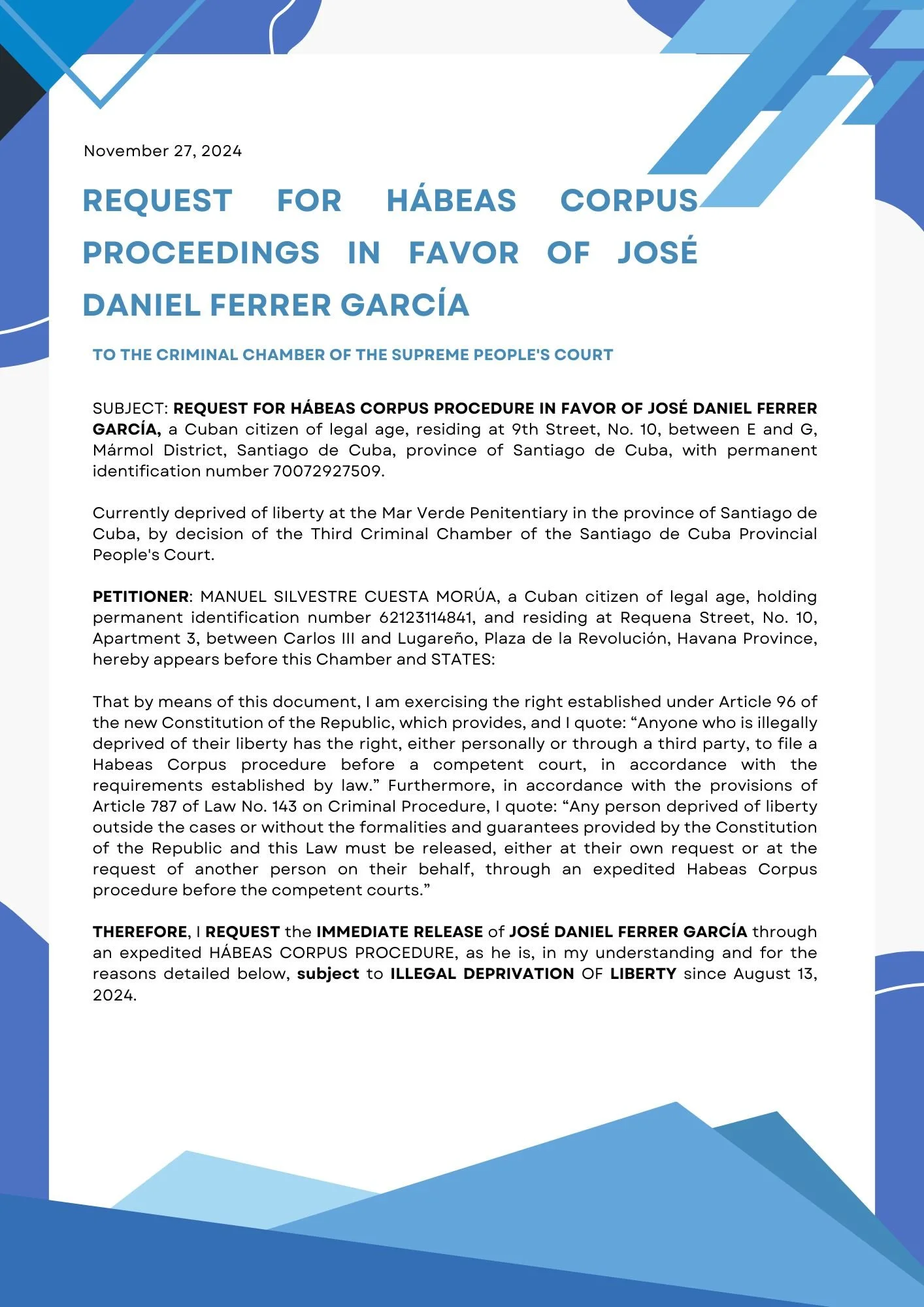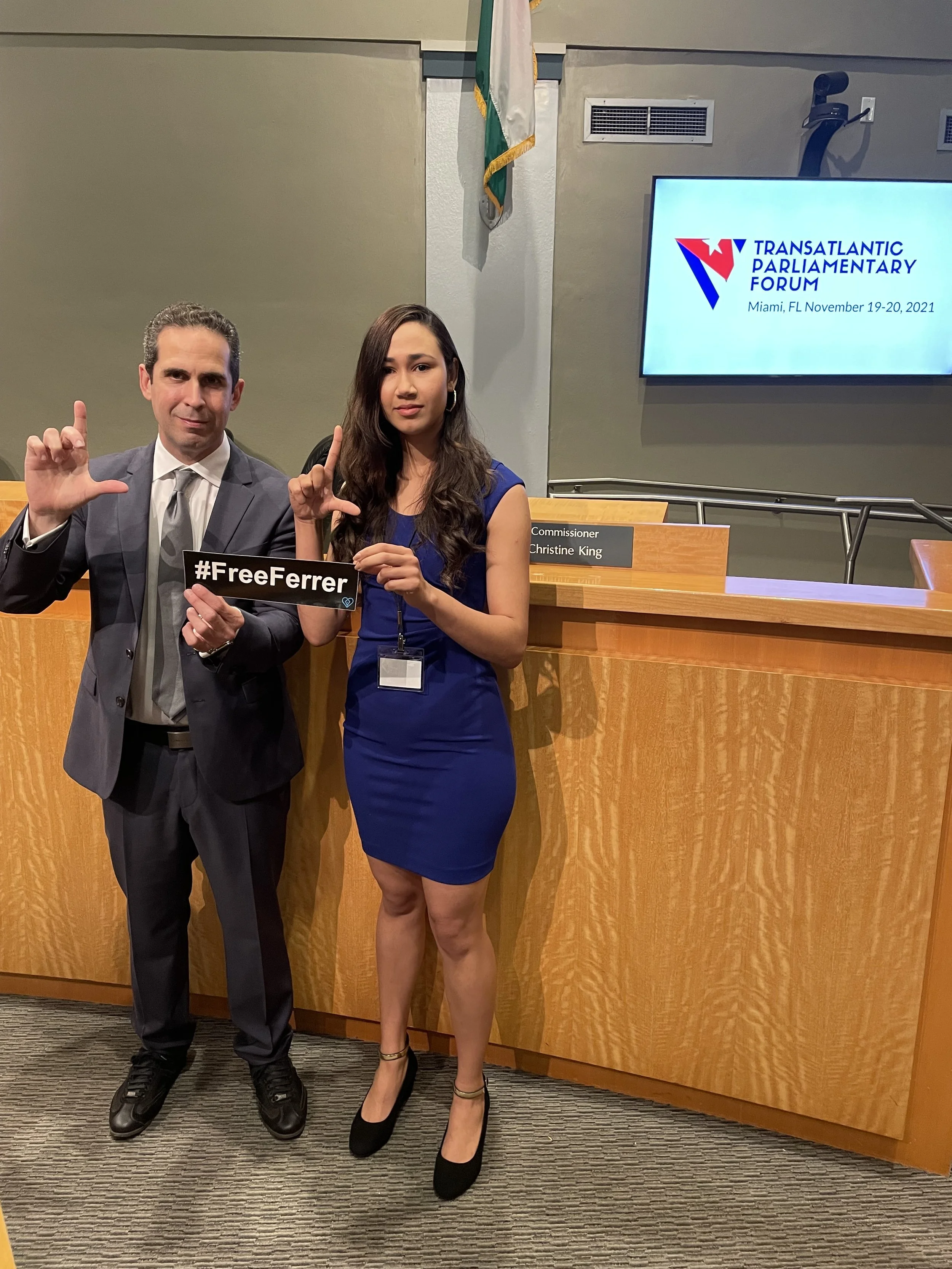José Daniel Ferrer: A Symbol of Resilience in Cuba’s Fight for Freedom
From DEMOCRATIC SPACES, we support the recent Habeas Corpus petition filed with the Cuban Supreme Court by Manuel Cuesta Morúa, Vice president of the Council for the Democratic Transition in Cuba on November 27, 2024. We worked closely with the Council on this project and view it as a moral duty to advocate for the release of José Daniel Ferrer and all political prisoners.
The Habeas Corpus procedure, prepared by legal counsel Julio Ferrer, demands the immediate release of political opponent and prisoner José Daniel Ferrer, who, according to reports from his family, recently suffered a "brutal beating" in prison. The petition, referenced as Case 177, asserts that Ferrer should have been released on August 13, 2024.
It highlights that his sentence calculation failed to account for the days he spent under provisional detention before sentencing and the period of limited freedom following his conviction. Consequently, the document argues, Ferrer is being subjected to illegal detention, making him eligible for Habeas Corpus relief under Cuban law.
Creativity, Resistance and Advocacy
In resistance struggles, creativity is a crucial component. Finding innovative ways to generate international pressure for a cause is essential. Despite the totalitarian regime in Cuba—where there is no separation of powers, the judiciary is subordinated to the interests of the ruling elite, the rule of law is nonexistent, and laws are interpreted for the regime’s convenience—it remains important to demonstrate, with evidence, that even under Cuban law, Ferrer’s continued imprisonment is unlawful.
No one should be deprived of their freedom for holding different opinions or exercising fundamental human rights, as is the case with José Daniel Ferrer and thousands of other political prisoners in Cuba.
Ferrer’s Background
José Daniel Ferrer García a prominent pro-democracy leader in Cuba who has dedicated most of his adult life (30 years) advocating for democratic changes in Cuba.
His activism has earned him the designation of Prisoner of Conscience by Amnesty International (in 2003 and in august 2021) and his case has gained significant international attention.
The Victims of Communism Foundation awarded him with the Truman-Reagan Medal of Freedom Award in June 2020 for his persistence and courage in the face of physical danger and his decades long commitment in leading the peaceful struggle for democracy in Cuba.
Despite facing arrests, imprisonment, forced disappearances, and various forms of torture, José Daniel Ferrer García remains a symbol of resilience and determination in his fight for a democratic Cuba. The international community, including legislators and human rights organizations, continues to call for his immediate release and raise awareness of his plight.
José Daniel Ferrer García serves as the National Coordinator of the Patriotic Union of Cuba (UNPACU) and is the President of the Council for Democratic Transition in Cuba. Since its founding in 2011, UNPACU has been the largest pro-democracy organization in Cuba. In addition to advocating for democratic reforms and free elections, it engages in humanitarian work, such as providing free meals and medical assistance to vulnerable populations in Santiago de Cuba. Ferrer's wife, Dr. Nelva Ortega, a medical doctor, plays a significant role in these efforts.
Marta Ferrer Cantillo, daughter of José Daniel Ferrer and Michael Lima, Director of Democratic Spaces at the Transatlantic Parliamentary Forum at City Hall in Miami. Nov 20, 2021 with a sign that reads #Free Ferrer. In her presentation, Marta read an impassioned presentation describing the tortures and degrading treatment José Daniel suffers in prison.
Ferrer’s plight has garnered significant international attention, with prominent figures like U.S. Senator Rick Scott calling for his immediate release on numerous ocassins in the past 3 years. Media outlets such as The Washington Post, The New York Times, DW, and ABC Spain have extensively covered his case. Additionally, human rights organizations like Human Rights Watch, the Interamerican Commission for Human Rights have issued urgent actions, statements and press releases on his behalf.
The campaign for Ferrer’s release has spanned more than two decades, encompassing several periods of detention, including his imprisonment from 2003 to 2011, October 1, 2019, to April 3, 2020, and his numerous arbitrary arrests.
Ferrer was first arrested on March 19, 2003, during Cuba's Black Spring, receiving a 25-year prison sentence as part of the Group of 75. Released on probation in 2011, he was rearrested in 2019 and, in a flawed trial, sentenced to four and a half years of house arrest. On July 11, 2021, he was arrested again while en route to a protest and sentenced in August 2021 to four years and 14 days in Santiago de Cuba's Mar Verde Prison.
The most recent campaign began on July 11, 2021, the day he and his eldest son left their home to join pro-democracy protests in Santiago de Cuba and were arbitrarily arrested. The campaign has garnered support from the U.S. Congress and Senate, the European Union, Amnesty International, the Inter-American Court of Human Rights, and numerous organizations and activists worldwide.
More recently, on September 18, 2024, the European Parliament, through a resolution, urged the Cuban regime to immediately and unconditionally release José Daniel Ferrer and all individuals arbitrarily detained for exercising their rights to freedom of expression and peaceful assembly. The resolution passed with 382 votes in favor, 243 against, and 42 abstentions. It also demanded that Ferrer be granted access to a lawyer, be allowed to communicate with his family, and receive information about the reasons for his detention.
Enforced Disappearances
Ferrer has been subjected to enforced disappearances on three occasions:
From July 11 to October 8, 2021.
From April 30 to November 17, 2022, during which his family was denied communication or visits.
From March 7, 2023, and for over seven months thereafter, no further family visits were allowed.
Torture and Ill-Treatment
While imprisoned, Ferrer has suffered severe abuses, including:
Sonic Radiation: Described as high-pitched noises causing intense headaches.
Beatings: Notably, during a family visit on December 9, 2022, in front of his wife and children. More recently, on November 21, 2024, the family was informed that José Daniel had been subjected to a brutal beating at Mar Verde Prison and subsequently transferred to the hospital at Boniato Prison. Since then, his wife has been denied the opportunity to see him and confirm his health condition firsthand.
Death Threats: Against him and his family.
Threats against his wife, Dr. Nelva Ortega. On November 26, 2024, while Dr. Nelva Ortega was on her way to Mar Verde Prison to visit her husband, José Daniel, she was detained along with other activists. She was once again threatened with losing custody of her young son, Daniel José, and having her home confiscated.
Denial of Medical Attention: Denied necessary medication and given harmful drugs causing hallucinations.
Sleep Deprivation: Noise disturbances used to prevent rest.
Food Poisoning and Deprivation: Rotten or inadequate meals causing severe illness and weakness.
Isolation: Held in extreme conditions, separated from the general prison population. For over 20 consecutive months his wife, Nelva Ortega has been denied family, conjugal visits or even phone calls.
Call to Action
It is vital to continue international pressure and advocacy for the release of José Daniel Ferrer and all other political prisoners in Cuba. His ongoing detention underscores the Cuban regime’s blatant disregard for human rights and justice.

